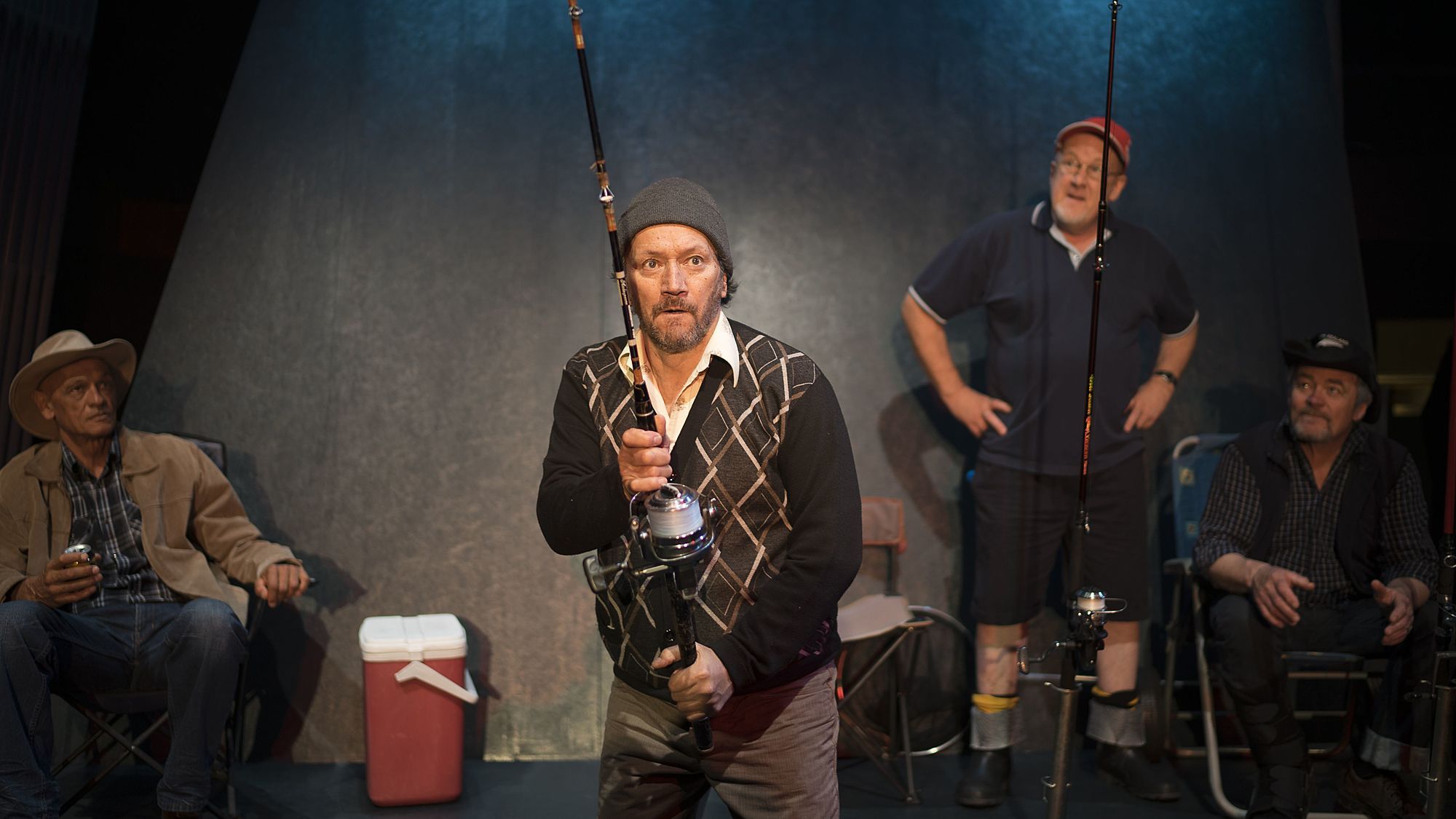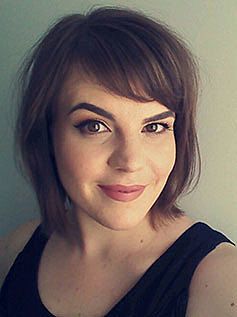Review: The Biggest
Hannah Banks reviews The Biggest by Jamie McCaskill, the latest in a long line of New Zealand plays about Kiwi Blokes, premiering at The Hannah Playhouse.
The Biggest has a familiar premise. In small town Aotearoa, four old blokes enter a fishing competition to win their mate a new boat after he lost his in an accident. They drink at the pub, they make fun of each other, and they go fishing. A few secret plot points start to emerge while deeper themes simmer beneath the surface. It’s a classic formula for a New Zealand play; the difference here, though, is that The Biggest feels slightly more contemporary and it has a lot of heart and intelligence.
Playwright and director Jamie McCaskill has created a classic, blokey New Zealand comedy that has a wide mainstream appeal. Think Roger Hall but with better jokes and a more diverse cast. The Biggest represents the rural male voice, the way they interact with each other and what lies beneath their hardened surfaces. There’s not really anything new here; McCaskill doesn’t reinvent the genre, but he has breathed some life into this tired format. McCaskill’s work can be described as syncretic theatre, using western dramaturgy to showcase indigenous perspectives, and this is what makes The Biggest distinctive. It is driven from a Maori point of view and it portrays a light-hearted but politicised view of mateship that acknowledges the differences within cultural identities in Aotearoa. The Biggest is modern Maori theatre that knowingly sits within the mainstream.
The Biggest opens in the town pub and takes a while to really get going. The first scene is long, setting up a slow rhythm that continues for at least the first half. There are a lot of interesting underlying themes about prejudice, age, family and death, but they all start to reveal themselves halfway through. Not that a playwright should show their whole hand at the very beginning; it’s not until the first fishing scene, though, that I actually start to get interested in the plot. As the tension rises in the last few scenes and the pace picks up, the script starts to really flow.
The target audience for this kind of work is huge, but it’s really not my thing. While I appreciate its necessity and firmly believe that theatre should be for everyone, not just the theatre community, I still always want a little more. I want to feel something when I watch theatre: doesn’t matter what that feeling is, it just needs to be something. With mainstream comedies like The Biggest, I find I struggle to relate and therefore I struggle to care. But that’s my personal taste; on opening night at The Hannah Playhouse, I could feel the audience around me laughing, feeling and caring about these characters.
And it is the characters in The Biggest that lift this play above the rest in its genre. The friendship and chemistry between the four blokes is what makes this play enjoyable, and McCaskill has cast four theatre legends who make everything look effortless. Jim Moriarty is charming and delightful as Walter, with a ruthless energy that holds the group together during the long scenes set in the pub. Peter Hambleton is straight up and stuck in his ways, all hands on hips and blustering confusion; as Stu, Tim Gordon subtly conveys the frustrations of recovering from an accident and the scene where he is finally back on a boat is excellent. Apriana Taylor’s Mick is a steady and quiet contrast to the other three and the scene where he discusses his past with Walter is the best in the play. These four characters are so carefully crafted and cover a gorgeous spectrum of blokiness, it makes them delightful to watch.
Part of the problem here could be the actual theatre; the Hannah Playhouse is all concrete brutalism, the opposite of the New Zealand that The Biggest symbolises. It’s hard to imagine the ocean when all you can see are straight lines and harsh concrete.
In supporting roles, Wesley Dowdell is the right amount of arrogant and ridiculous as Jan, the young fisherman who wins the competition every year, and Moana Ete does a fine job as Cassie, Walter’s daughter and the only female character. However, Cassie feels shoehorned in at times. Sure, Walter is her dad, but it’s never clear why she chooses to hang out with these old dudes at the pub and her relationship with Jan makes zero sense. I get that it might be slim pickings in small town New Zealand and perhaps unlikely couples do form, but this feels more like a convenient device to get one woman on stage. This is surprising coming from a playwright like McCaskill, as he has written excellent female characters in the past. Cassie just feels a bit out of place here, like a remnant from an earlier draft. The Biggest is absolutely a play about men and their friendships, but if women are going to be included then surely they can be more than just someone’s daughter, someone's girlfriend.
The design is pretty simple, and the designers take advantage of the architecture of The Hannah Playhouse. Jennifer Lal's lighting and Gil Eva Craig's sound design subtly enhance the play's realism with sunshine, chirping birds and breaking water. Tony De Goldi's set design is functional, different parts of the stage representing different locations with quick and easy transitions in between. This does mean, though, that the cast spend most of their time in the downstage left corner at the pub, which feels like a waste of space. In contrast to this, the scene where Jan is on his boat, yelling to the oldies on the shore, takes full advantage of this strange stage and the volume of their conversation is hilarious. The actors do end up shouting in almost every scene, mind, but this is probably just a result of the terrible acoustics in the Hannah Playhouse.
Despite several excellent elements, The Biggest is not really theatrical at all. The action isn’t varied or dynamic and would probably be better suited for film or television. Most scenes in the first half are people standing still and talking; once they start fishing it gets slightly more interesting, but the whole thing, while funny, remains very static. Sure, it might be strange if a play in this genre suddenly included a sequence of magic realism, but as an audience member I need something more theatrical than talking heads to hold my interest. Part of the problem here could be the actual theatre; the Hannah Playhouse is all concrete brutalism, the opposite of the New Zealand that The Biggest symbolises. It’s hard to imagine the ocean when all you can see are straight lines and harsh concrete.
Even so, The Biggest is an enjoyable piece of theatre; these actors are amazing and the story is fun. But the thought I come away with is it could have been so much more than this. McCaskill writes in the programme that this work came from the period of time he spent in Thames from 2011 to 2014 and it was inspired by the people he met there. From this same period also came his play Not In Our Neighbourhood, which is the polar opposite to The Biggest. The extreme contrast certainly shows McCaskill’s skill as a writer: Not In Our Neighbourhood is incredibly theatrical and powerful, an important contribution both to theatre and to increasing awareness of domestic violence in Aotearoa.
What I find interesting about this comparison is that Not In Our Neighbourhood clearly focuses on women, whereas The Biggest is all about rural Kiwi men. When I look at New Zealand theatre, Not In Our Neighbourhood is a stand-out. An absolute rarity. But there are a lot of mainstream plays in Aotearoa New Zealand that explore masculinity. Yes, The Biggest is better than the rest of them, but did we really need another one?
The Biggest runs at
The Hannah Playhouse, Wellington
from Saturday 29 October to Saturday 12 November
For tickets to and more information about The Biggest, go here. Image credit: Paul McLaughlin.

